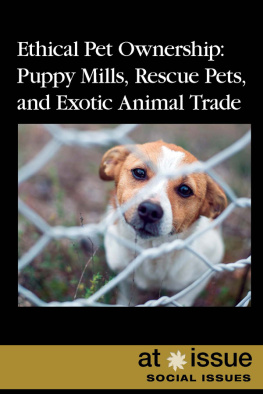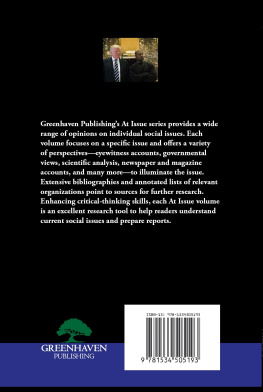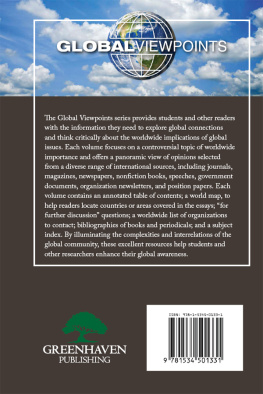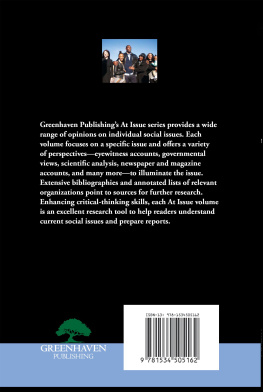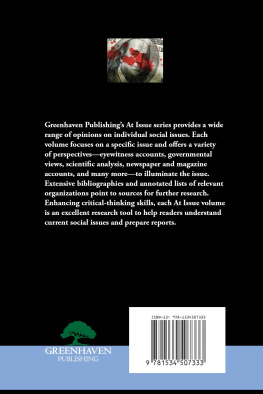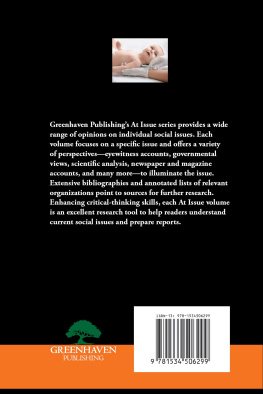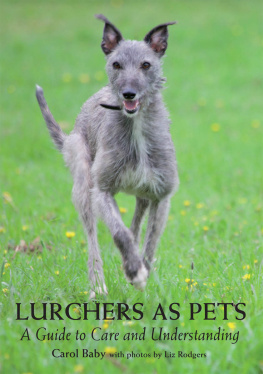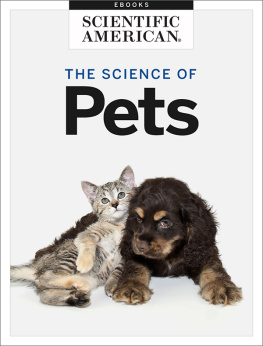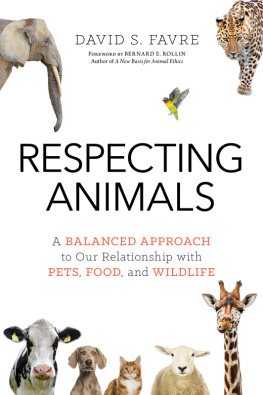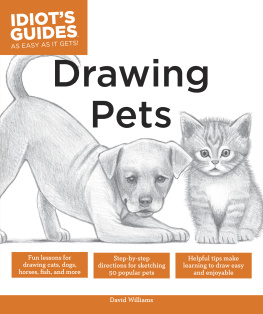Other Books in the At Issue Series
Americas Infrastructure
The Deep State
The Federal Budget and Government Spending
Gerrymandering and Voting Districts
Media Bias and the Role of the Press
Political Corruption
Politicians on Social Media
Presentism
The Role of Religion in Public Policy
The Role of Science in Public Policy
Troll Factories
Published in 2019 by Greenhaven Publishing, LLC
353 3rd Avenue, Suite 255, New York, NY 10010
Copyright 2019 by Greenhaven Publishing, LLC
First Edition
All rights reserved. No part of this book may be reproduced in any form without permission in writing from the publisher, except by a reviewer.
Articles in Greenhaven Publishing anthologies are often edited for length to meet page requirements. In addition, original titles of these works are changed to clearly present the main thesis and to explicitly indicate the authors opinion. Every effort is made to ensure that Greenhaven Publishing accurately reflects the original intent of the authors. Every effort has been made to trace the owners of the copyrighted material.
Cover image: Empirephotostock/Shutterstock.com
Library of Congress Cataloging-in-Publication Data
Names: Idzikowski, Lisa, editor.
Title: Ethical pet ownership : puppy mills, rescue pets, and exotic animal trade / [edited by] Lisa Idzikowski.
Description: New York : Greenhaven Publishing, 2019. | Series: At issue | Audience: Grade 9 to 12. | Includes bibliographical references and index.
Identifiers: LCCN 2018028210| ISBN 9781534503793 (library bound) | ISBN 9781534504455 (paperback)
Subjects: LCSH: Pet ownersJuvenile literature. | Pet adoptionMoral and ethical aspectsJuvenile literature. | Animal rightsJuvenile literature.
Classification: LCC SF411.4 .E84 2019 | DDC 636.088/7dc23
LC record available at https://lccn.loc.gov/2018028210
Manufactured in the United States of America
Website: http://greenhavenpublishing.com
Introduction
We and our affiliates provide hands-on care and services to more than 100,000 animals each year ... seeking a humane world for people and animals alike. We are ... combating large-scale cruelties such as puppy mills, animal fighting, factory farming, seal slaughter, horse cruelty, captive hunts and the wildlife trade.
The Humane Society of the United States
D ogs, cats, freshwater fish, birds, rodents, reptiles, horses, and saltwater fishone of these animals probably comes to mind when we think of the pets that people have in their lives. In America, around 85 million peopleor about 68 percent of householdsreport having pets. Dogs are the most common pets and account for almost half of all households. Cats are the next most common companion animal, sharing the homes of roughly 35 percent of the population, while horses and saltwater fish each account for 2 percent.1
Owners recognize that pets can impact their lives in positive ways, including providing love, companionship, stress relief, and amusement. Many pet people also admit that they buy Christmas and birthday gifts for their animal friends, and according to the Pew Research Center, roughly 85 percent of dog owners consider their pets to be a part of the family.2
With the evident popularity and proven positive benefits associated with pet ownership, one might wonder what possible controversy could be broiling. Not surprisingly, the topic of ethical pet ownership is a complicated one, and debate tends to center around four main topics: the ethics of keeping animals as pets, puppy mills, rescue pets, and the exotic animal trade.
Research and reports by Harvard Medical School detail the ways that dogs improve the lives of their owners and other people.3 Besides love and companionship, dog owners get more exercise, feel calmer and find it easier to shed stress, and become more social and less isolated as a result of pet ownership. Older individuals reap the same benefits from visits by therapy dogs, and kids can learn responsibility by caring for a pet. Nonetheless, there is the basic question of whether animals should be kept as pets at all. Ethicists argue against keeping petswhich are living, breathing, and feeling sentient beingsfor a variety of reasons. They cite statistics showing that many owners never take their dog or cat to the veterinarian, either for wellness checks or when illness strikes. What about wild or exotic animals? Small animals such as reptiles and birds live their lives as pets confined in tiny tanks or cages. Larger species cant possibly be afforded the quality of life they would have in their natural habitats, but this doesnt prevent people from buying tigers, monkeys, and other large wild animals. Buyers fool themselves into thinking that these wild creatures can somehow be happy living in unnatural conditions. PETA, the largest animal rights organization in the world, believes that living creatures should not be under the control of humans in any way: they should not be eaten, experimented on, used for clothing or entertainment, or abused in any form.
The anger directed towards puppy mills is well deserved. A puppy mill, as defined by the Humane Society of the United States, is an inhumane commercial dog-breeding facility in which the health of the dogs is disregarded in order to maintain a low overhead and maximize profits. Its hard to believe that the US Department of Agriculture encouraged the dog breeding business that ultimately resulted in puppy mills, but thats exactly what happened after World War II.4 Soldiers returning from the war faced an agricultural market that wasnt profitable, and something had to replace lost farming wages. At the same time, it was becoming fashionable for individuals and families to purchase purebred dogs as pets. The USDA stepped in and suggested to farmers that they could support their families by breeding purebred dogs. Inexperienced and cash-strapped farmers kept dogs in poor conditions, skimped on food and veterinary care, and focused on profits. Today, almost all pet store puppies come from puppy mills, according to the Humane Society of the United States, and eager individuals and families looking for companion animals fall prey to this scheme of prioritizing easy money over care for animals. Despite existing efforts to eliminate puppy mills, many more steps must be taken to effectively put an end to them.
Two other options are available when purchasing a dog or puppy. With some research and patience, people seeking a canine companion can avoid supporting the puppy mill trade and instead choose a bona fide dog breeder. Reputable dog breeders arent in the business to make money off the animals, they only want to recover expenses incurred from raising their puppies. They are often dedicated to specific breeds of dogs and want their cherished puppies to go to the best homes. Consequently, these breeders dont sell their pups to just anyone with cash. They interview potential dog parents, questioning why a canine pet is wanted, and some breeders may insist on visiting a persons home to make sure everything will be right for their pups.
Another option is to adopt a dog, cat, or other animal from a shelter or rescue. Animal shelter or rescue groups can be found in many larger cities, and there are also some organizations operating on the national level. Shelters and rescues get their animals from a variety of sources. Sometimes private individuals can no longer care for a pet and they hand it over to a shelter. Other animals may be rescued from areas hit by natural disasters or from the streets. Some organizations like the Humane Society of the United States employ animal rescue teams that jump in and save animals from puppy mills, animal hoarders, or places destroyed by disasters. And the Society says that adopting the 6-8 million animals available yearly is the best way to find a new pet. However, as the viewpoints in this volume will indicate, there are other ethical and practical considerations to keep in mind regarding rescue or shelter pets. These include whether no-kill shelters encourage shelter staff to adopt out animals that have serious health or behavioral problems and will be excessively difficult to care for, along with whether shelter staff has the right to determine if an animal deserves to live.

